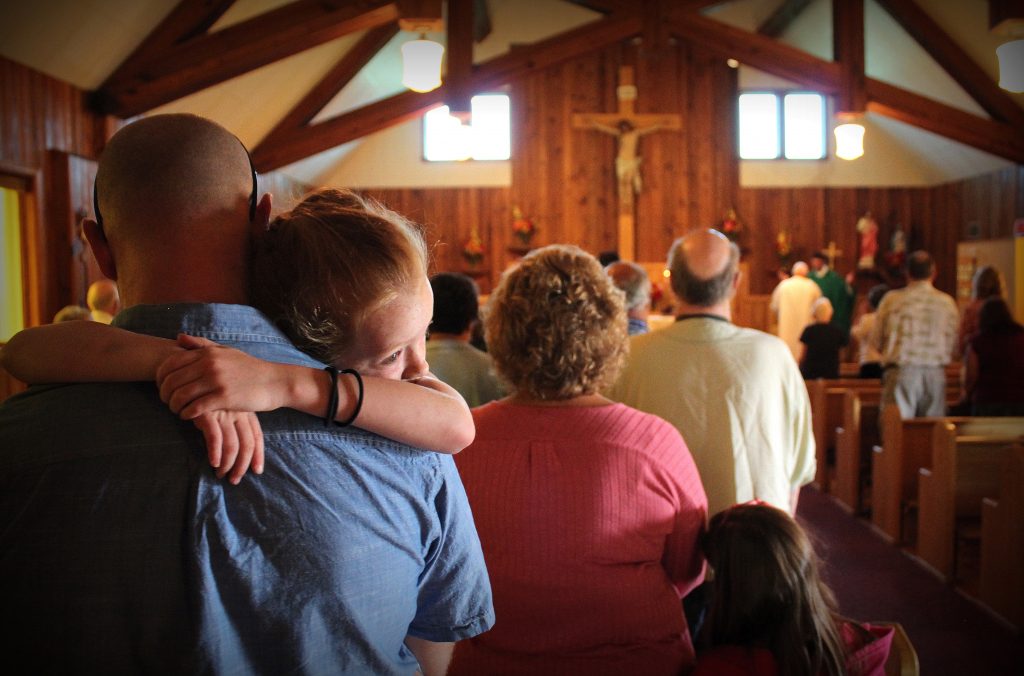“Finish the following sentence: A father is…”
In the upcoming Apple TV+ documentary “Dads,” the responses to this challenge vary widely.
“My compass,” says one celebrity dad. “A hero?” proposes another. And with a nervous laugh, a third responds, “Who knows?”
These answers, along with many others in the film, offer a snapshot of mainstream culture’s understanding of fatherhood, one with several kernels of truth, but also plenty of confusion.
Bryce Dallas Howard, daughter of Academy Award-winning director Ron Howard (“Apollo 13,” “A Beautiful Mind”), directs this 87-minute documentary scheduled for release on Father's Day weekend. In a film composed almost entirely of interviews with dads (including her own father and grandfather), Howard presents firsthand fatherhood experiences, from celebrities to stay-at-home dads.
From the outset, the film acknowledges the elephant in the room: In today’s society, the definition of fatherhood is fluid, evasive, and sometimes controversial. But we still celebrate Father’s Day, and Howard is determined to find out what true fatherhood means. While the film does highlight some great dads, it fails to reach that central goal.
This hardly comes as a surprise. After all, Howard seeks an answer that today’s culture cannot give.
To be fair, the film is not entirely at a loss about the essence of fatherhood. Throughout, the conversations portray human fatherhood as something more profound than mere biological reproduction. Rather, an instinctive love and commitment awakens in men who have brought children into the world.
Regardless of background or belief, every father in the film has a deep sense of responsibility. Will Smith recalls how he drove home from the hospital with his wife and first child with extreme caution. Jimmy Fallon describes how the birth of his daughter transformed his sense of identity: “I’m no longer Jimmy Fallon — I’m Winnie’s dad.”
Countless others express how with the birth of their children, they suddenly realized that life is no longer about them, and that they would willingly sacrifice anything to help their children thrive. For all of them, to even think of abandoning their post would be catastrophic, both for their children and themselves.
However, this natural sense of fatherly responsibility can only take us so far, and as a result, this film fails to capture three essential aspects of fatherhood: a gift to humanity, a gift to men, and a gift to marriage.
First, although “Dads” recognizes that human fatherhood has a special nobility, it cannot explain why. As secularization has seeped into our society, it has triggered a widespread rejection of the faith that reminds us of our Father in heaven, who gives us life and the ability to beget life in his image and likeness.
St. Pope John Paul II discusses this gift in his encyclical on the family, “Familiaris Consortio” (“The Fellowship of the Family”). “When they become parents, spouses receive from God the gift of a new responsibility,” he writes. “Their parental love is called to become for the children the visible sign of the very love of God.”
Several interviewees do express a sense of awe, unworthiness, and gratitude for their fatherhood. But often, this sense of gift disintegrates. As the film hints on several occasions, modern technology now allows for reproduction through artificial means, such as surrogacy and in vitro fertilization. These technologies, which several featured dads have used, encourage a mindset in which children are not so much as received as they are obtained.
The removal of the appreciation for this gift is a severe blow to the dignity of fatherhood, which was designed and bestowed in a way that we neither chose nor deserved.

Second, “Dads” trades in a reverence for fatherhood as manhood for a vague, neutral sense of parenthood. Indeed, one might wonder whether the film could be called “Male Parents” rather than “Dads.”
At no point does anyone suggest that what dads offer kids might differ from what moms offer. One dad even makes the point, “Other than pregnancy, birth, and breastfeeding, a man can do everything else.” This could very well be true, but without any acknowledgement of unique virtues that great fathers manifest, the film gives the impression that men and women are interchangeable.
What would have been even more enlightening would be to note how men in particular can help their children in a way that women cannot automatically replace. Dr. Jeffrey Shears, a professor in the Department of Social Work at the University of North Carolina at Greensboro, has researched the importance of fatherhood throughout his career. In a 2015 lecture at Princeton University, Shears described the impacts that fathers have on the lives of their children.
“Fathers offer something unique,” he said. For example, they tend to be more involved in physical, “rough and tumble” play with their children than mothers are. Often, he noted, when a father walks into the living room where his toddler is playing quietly, he will scoop the child up and toss him or her into the air.
Unfortunately, our culture’s newfound aversion to celebrating the difference between men and women prevents the film from paying tribute to these fatherly qualities. As a result, it dilutes the singular value of fatherhood as its own parental role.
Finally, “Dads” sadly misses the fact that fatherhood is a gift to marriage. In some moments, interviewees mention the importance of parents working as a team. But overall, the film dedicates a disproportionate amount of time to father figures who are not in a committed marital relationship with their children’s mother, including an unmarried dad and a gay couple.
While these examples present affectionate and selfless men, they also reinforce the film’s message that fatherhood can be analyzed in a vacuum.
In the same Princeton lecture, Shears echoed extensive research showing that in order to have the best impact on his children, a good father must have a strong relationship with their mother. A healthy relationship between mom and dad is crucial, he said, because “women internalize how they will be treated, how they see the world, based on not necessarily how you treat them, but how you treat their mother.”
Shears acknowledged that good fathers can and do exist outside of marriage — as several examples in the film reflect — but ultimately, the ideal for both the parents and the children is marriage.
Of course, we live in a world in which many families do not have that ideal. This does not prevent countless men from being excellent fathers, but to regard marriage and the mother-father relationship as completely unrelated to quality fatherhood is a disappointing oversight.
In a culture that tends to avoid conversations about gender, family values, and parenting for fear of offending others, “Dads” sets out on the noble mission of honoring and analyzing that still more noble title of “Dad.”
But apart from a few heartwarming examples of fatherly devotion, the film provides no more than a hesitant, bland idea of fatherhood itself.
As a result, it creates more questions than answers. It leaves the audience wondering, “What even is a father?” “How are fathers any different from mothers?” “How much do kids really need fathers?” But since these crucial questions are too dicey for our culture to discuss, “Dads” cannot or will not answer them.
Families need more than that — and fathers deserve more than that.
“Dads” will be available for streaming June 19.

